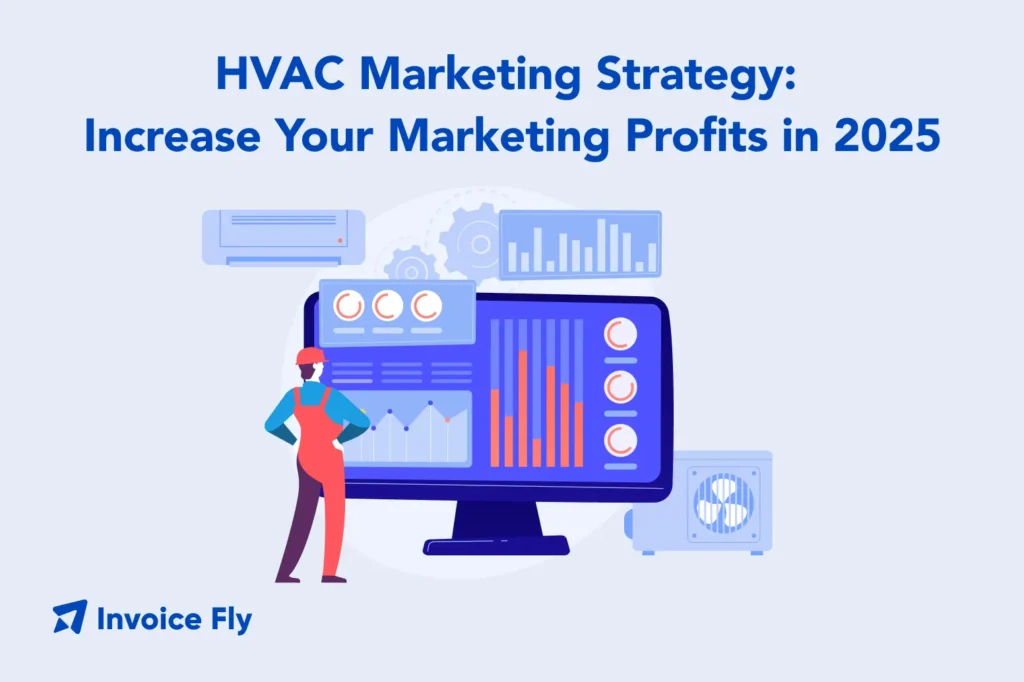HVAC Marketing Strategy: Increase Marketing Profits in 2025

Table of Contents
- 1. Make Your HVAC Website Mobile-Friendly
- 2. Optimize Your HVAC Website for SEO
- 3. Set, Manage, and Adjust Your HVAC Marketing Budget
- 4. Add Email Marketing to Drive HVAC Leads
- 5. Focus on Lead Tracking and Reporting
- 6. Demand Transparency with Call Tracking Software
- 7. Verify and Promote Your Google Business Profile Page
- 8. Tell Your Company’s Story in Videos or Blogs
- 9. Make Your Brand Sticky and Disruptive
- 10. Ask HVAC Clients for Google Reviews
- 11. Master Local SEO Strategies by Geo-targeting the Right Audience
- 12. Buy Google Local Services Ads to Gain Better Visibility
- 13. Leverage HVAC Direct Mail Marketing to Reach Customers
- 14. Use an App-Based HVAC Lead Generation Service
- 15. Measure Results for All HVAC Marketing Strategies
- 16. Deliver Awesome Customer Service From Start to Finish
- Keep Your HVAC Marketing Working Hard for You in 2025
- FAQs about HVAC Marketing Strategies
You don’t need a massive marketing department to see major results, but you do need a solid marketing strategy that works for you. The right strategy in 2025 will help you reach more homeowners, generate qualified leads, and turn phone calls into paying jobs.
In this guide, we’ll walk you through a powerful HVAC marketing strategy built for today’s landscape: mobile-first, search-driven, and customer-focused.
In this guide:
- Why a modern HVAC website is step one
- How to improve your visibility with SEO
- The power of email marketing, social media, and direct mail
- Local lead generation tactics (that actually work)
- Smart tracking tools to measure what’s working
- Final marketing tips to retain more customers

1. Make Your HVAC Website Mobile-Friendly
Your website is your digital storefront. 63% of consumers prefer to find information about brands and products on mobile devices, therefore a mobile-friendly site is a must.
What this means:
- Fast page loads on mobile devices
- Clear contact information (phone number, email address)
- Easy-to-read service descriptions
- Click-to-call buttons
- Responsive design
Search engines like Google also prioritise mobile-optimised sites in local search results. So if your site’s hard to use on a phone, you’re most likely already losing business.
2. Optimize Your HVAC Website for SEO
Your potential customers are already typing phrases like “AC repair near me” or “residential HVAC maintenance” into search engines. If your site doesn’t appear, you’re not positioning yourself well in the race.
To optimise your site for HVAC SEO:
- Use location-specific keywords (e.g., “air conditioner repair in Phoenix”)
- Create dedicated service pages for every offering
- Add header tags and meta descriptions to each page
- Include your business address and phone number sitewide
- Write helpful blog posts that answer common HVAC questions
Related reading: How to Start an HVAC Business
3. Set, Manage, and Adjust Your HVAC Marketing Budget
Don’t just throw money at ads and hope something sticks. A smart budget outlines what you’re spending, where it’s going, and what kind of return you expect.
Break it into categories:
- Google Ads (or Local Services Ads)
- SEO & website updates
- Social media advertising
- Print or direct mail campaigns
- Email marketing tools
Pro tip: Review the performance monthly and adjust based on what’s converting.
4. Add Email Marketing to Drive HVAC Leads
Email marketing is one of the most cost-effective HVAC marketing ideas. Perfect for following up with customers after service, offering seasonal reminders, and keeping your business top of mind.
Email ideas:
- HVAC maintenance reminders
- Exclusive promotions or coupons
- Blog content about energy savings
- Referral incentives
Pro tip: Use automation to save time and segment your customer base by past jobs, location, or system type.
5. Focus on Lead Tracking and Reporting
Every phone call, form submission, or chat message should be tracked. Without tracking, you can’t tell what’s driving leads (or wasting money).

Use tools like:
- Google Analytics
- CallRail or ServiceTitan (for call tracking)
- HubSpot or Mailchimp (for email analytics)
This data helps you double down on what’s working and scrap what’s not.
6. Demand Transparency with Call Tracking Software
Call tracking helps you pinpoint exactly which campaign, platform, or keyword brought in a new customer. It’s also a great tool for monitoring your customer service team’s performance.
You can assign different phone numbers to different ad campaigns, then review the recorded calls to improve messaging or service quality.
7. Verify and Promote Your Google Business Profile Page
Your Google Business Profile is often the first impression a customer has of you. Make it count.
Optimise it by:
- Selecting the right business categories
- Uploading recent job photos
- Adding service details and business hours
- Encouraging customer reviews
- Responding to reviews professionally
Related reading: HVAC Technician Salary Guide 2025
8. Tell Your Company’s Story in Videos or Blogs
People want to hire HVAC contractors they trust so it helps to show them who you are.
Share:
- Team videos or technician introductions
- Behind-the-scenes service footage
- How-to blog posts or energy-saving tips
- Case studies from satisfied clients
Video examples:
- A day in the life of an HVAC technician
- Seasonal maintenance walkthroughs (e.g., “Spring AC Prep”)
- Customer testimonials captured on-site
- Explainer videos on HVAC systems or services
Blog ideas:
- “How to Choose the Right HVAC System for Your Home”
- “5 Signs Your Furnace Needs Replacing”
- “The Real Cost of Skipping HVAC Maintenance”
- “What to Expect During a Service Call”
The more relatable, helpful, and consistent your content is, the more traffic to your site you’ll generate — while giving potential clients confidence in your service quality.
9. Make Your Brand Sticky and Disruptive
Your brand should stand out — and stick around in your customers’ minds.
Try:
- Wrapping your service vans with bold designs
- Using a memorable slogan on your invoices
- Creating custom HVAC magnets or stickers
- Posting consistently on your preferred social media platform

A disruptive brand doesn’t mean loud or pushy. It just means unforgettable.
10. Ask HVAC Clients for Google Reviews
Positive reviews build trust and boost your visibility in local search results.
After every job:
- Ask in person
- Include a QR code on your invoice or magnet
- Send a follow-up email with a direct review link
Remind loyal customers how much their feedback helps.

11. Master Local SEO Strategies by Geo-targeting the Right Audience
To rank higher in your area:
- Add service area pages to your website (e.g., “Furnace Repair in Dallas”)
- Include location names in meta tags, headings, and URLs
- Use schema markup for local businesses
- Link out to nearby organisations, vendors, or partnerships
Local SEO isn’t just about ranking. It’s about reaching customers who are most likely to convert.
12. Buy Google Local Services Ads to Gain Better Visibility
Google Local Services Ads appear at the very top of search results and display your HVAC company with a Google Guarantee badge.
Why they work:
- Pay per lead, not per click
- Includes your rating and phone number
- Boosts credibility
They’re especially helpful during peak HVAC seasons when competition is high.
13. Leverage HVAC Direct Mail Marketing to Reach Customers
Despite what people may think, print marketing is not dead. Especially within the HVAC service industry.
Send:
- Seasonal postcards
- First-time customer discounts
- Reminders before summer or winter
Make sure your design includes:
- Your contact information
- A compelling offer
- A strong call-to-action
14. Use an App-Based HVAC Lead Generation Service
Apps like Thumbtack can connect you with real-time customer requests. Keep in mind that these leads are competitive so ensure you respond fast and with clear value.
Choose services that let you:
- Set your own service area
- Filter job types
- Control your spending
15. Measure Results for All HVAC Marketing Strategies
You can’t improve what you don’t measure. Create a simple dashboard to track:
- Website traffic
- Phone calls and conversion rates
- Cost per lead
- Google review count
Use this data to cut low-performing campaigns and double down on what’s working.
16. Deliver Awesome Customer Service From Start to Finish
Customer experience still matters more than any ad. In all industries, happy customers come back, refer friends and family and leave glowing reviews.
Great service means:
- Showing up on time
- Communicating clearly
- Respecting their home
- Following up after the job

Keep Your HVAC Marketing Working Hard for You in 2025
Your HVAC marketing strategy doesn’t stop once your campaigns are live. In 2025, long-term success is about refining your approach, keeping your customer journeys seamless, and using real-time feedback to improve your results.
Optimizing for mobile, refining your landing page, or streamlining your phone call follow-ups all require the same consistency. The key is to stay active, adjust based on user experiences, and meet your local customers where they are — both online and off.
Need a professional way to send quotes or invoices? Try our free Invoice Maker to simplify your process.
FAQs about HVAC Marketing Strategies
Start with local SEO, Google Business Profile optimisation, and asking for reviews. These strategies are cost-effective and can quickly build your visibility in your local market.
Yes—especially for brand awareness. Use your preferred social media platform to share tips, customer feedback, behind-the-scenes content, and promotions. It helps keep your customer base engaged and informed.
Many HVAC companies spend 5-10% of their revenue on marketing. Start small, track your ROI, and increase your budget toward the platforms that drive the most leads.
Absolutely. Email helps you stay in touch with existing customers, promote seasonal services, and boost repeat business. Just make sure your email address is visible and your message is relevant.
Consistency. Whether you’re writing a blog post, updating your contact information, or running ads, the more consistently you show up across the web, the more trust you’ll build with potential customers and search engines alike.
